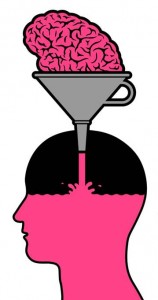Knowledge and Persuasion
Last week I went on a little rant against those who tell us that in this Google Age it’s not important to stuff your head with facts. I showed how on having a deep well of knowledge to draw from is so critical for effective thinking. But what about persuasion? Compared to clear thinking and compelling communication, it would seem that having a lot of facts at your command would seem to be relatively less important. In this article, I’d like to show that depth of knowledge is a huge asset for persuasion as well.
Regular readers know that one of my key themes is that content is king. It’s wonderful to have a gift of gab and to know how to pull all the persuasive strings, but without a lot of facts at your immediate command, you can look like a fine pen that is running out of ink.
Unless you make a living as a writer, most of your persuasion is real time, so you’re not going to have time to look up the information you need to support your point. In a dialogue where two people are trying to influence each other, the one who has the necessary facts at their command when they need them is likeliest to prevail.
Have you ever seen someone deliver a slide presentation and look at the slides most of the time? They use them as a crutch and a memory aid for their “talk track”, and it’s obvious that they don’t have full mastery of the material. Yet, they’re trying to talk you into something based on that material. The content may be airtight, but yet it’s unconvincing; they come across as content mercenaries, fighting for someone else’s ideas.
If you’re a salesperson, it’s especially because knowledge is so readily available that you have to “add value” and that is in the form of proprietary knowledge. You are the one who knows how to diagnose needs (which require a much deeper knowledge and analysis than wants). The customer knows about his or her own business operations and processes, and they can look up and compare product specs easily enough, but you make a living with your special expertise that connects those two pools of knowledge.
Having a facile and fluent command of facts and detail has a strong subliminal effect in its own right. Knowledge is impressive. We admire those who have a deep grasp of their topic, who can pull up concrete and specific facts to support their arguments. On the flip side, we see this every political season, in which an inexperienced candidate is lambasted in the press for not knowing the name of a key foreign leader, for example.
Deep knowledge can also make your communication more compelling by adding specificity and concrete detail. It’s one thing to say that your product makes your customer’s business process more efficient; it’s far better to say, “We speed up the reconcilement process by 35%, which cuts an average of four days out of your accounts receivable.”
Want to impress an audience, especially one comprising senior level executives? Then tell them something new and be prepared to deep dive, both of which require you to know a lot. When you’re presenting to an audience, it’s often the detailed grasp you can demonstrate during the Q&A that will convince the listener. When I interviewed senior executives for my book on sales presentations, several of them told me that they like to “scratch beneath the surface” of the presentation to test the presenter’s depth of knowledge. If it’s a technical presentation, they may not personally have the knowledge to assess everything that’s told to them, so they use this tactic as a gauge of the presenter’s credibility.
There’s a cute story about the physicist Max Planck, who used to travel around Germany delivering physics lectures. One day his chauffeur made an interesting proposal: he said they should trade places at the next lecture, since he had heard the lecture so many times that he was sure he could deliver it word for word. Planck agreed, and the plan proceeded. Everything went perfectly, until the question and answer period, when a distinguished professor asked a difficult question about some esoteric detail in the lecture. The chauffeur, without skipping a beat, said: “Herr Professor, I am surprised that someone as knowledgeable as yourself would ask such a question. To prove how simple it is, I will let my driver answer it.”
Unlike Planck’s driver, you probably won’t have the luxury of someone sitting in the audience to bail you out, so you had better become that expert.




